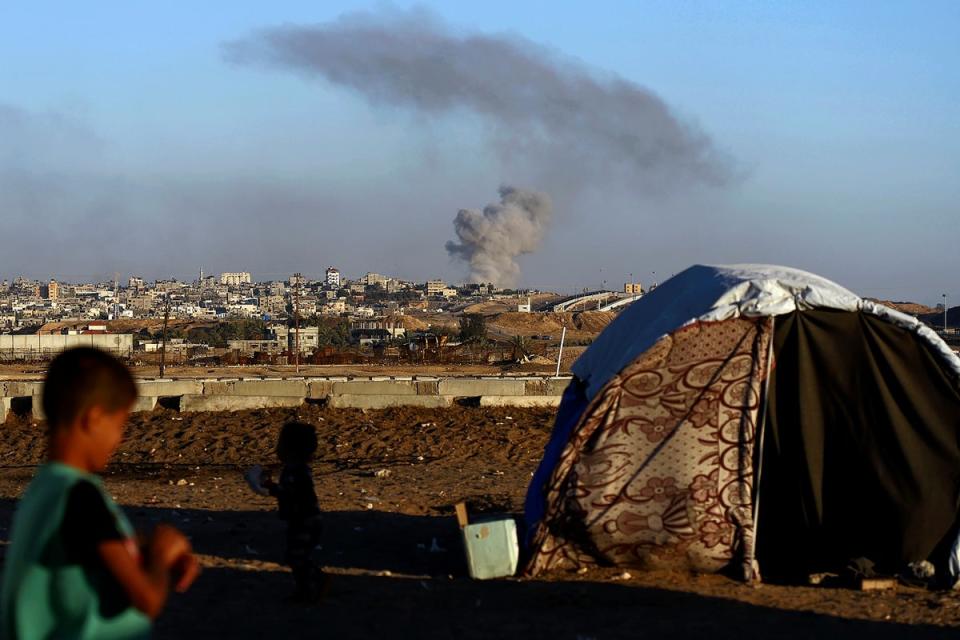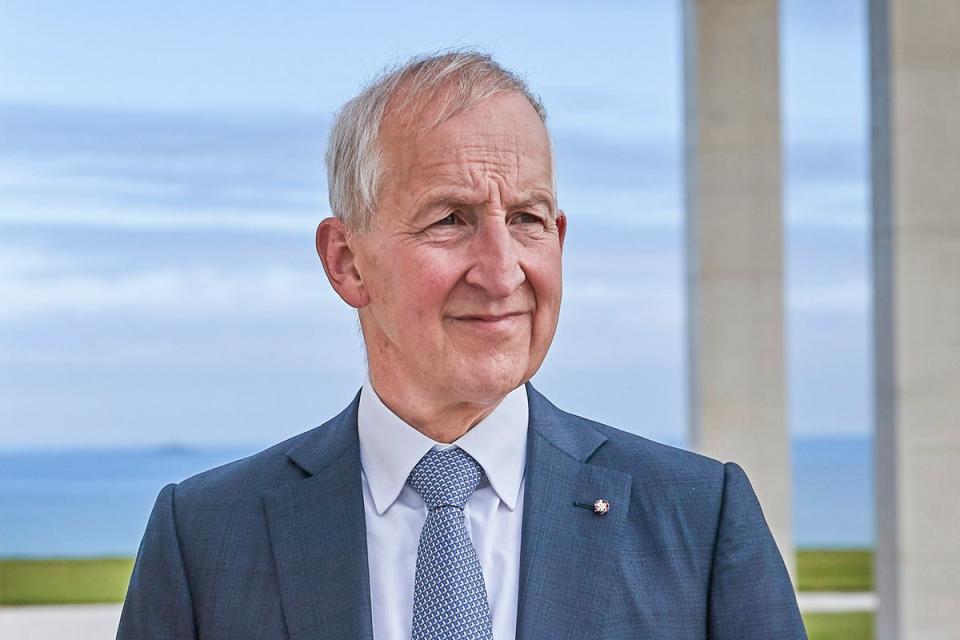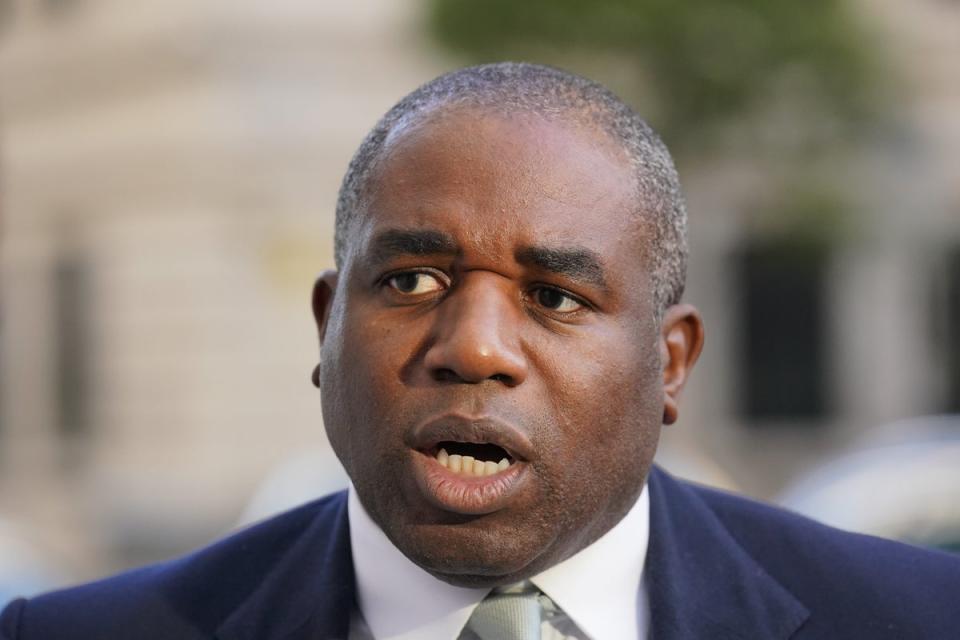UK should have been ‘ahead of US’ in suspending arms sales to Israel, ex-national security adviser says
A former UK national security adviser has criticised Rishi Sunak for failing to suspend arms sales to Israel after the US paused a shipment of bombs overnight.
Crossbench peer Peter Ricketts said it was unfortunate that Britain had not taken a stand, adding that it should have been “ahead of the US” on the decision.
The prime minister is facing mounting pressure, including from within his own party, to immediately suspend arms to Israel amid a growing outcry at the number of Palestinian civilians killed in its war on Hamas.
The Biden administration halted the munitions shipment as concerns grew about Israel’s plan to launch a full-scale assault on the city of Rafah in southern Gaza. More than a million civilians are sheltering in the area after they were forced to leave other parts of the strip.
A senior official in the US – a huge contributor of military aid to Israel – said a final decision had not yet been taken on whether the shipment of 1,800 2,000lb bombs and 1,700 500lb bombs would go ahead as planned.

In the wake of the decision to pause the shipment, Lord Ricketts said the UK government should suspend its own arms sales to Israel, adding: “It was a pity the government could not have taken a stand on this and got out ahead of the US. That remains the step I think the UK should take.”
His call was echoed by former cabinet minister and Tory MP David Jones, who told The Independent: “We should give similar consideration to a pause. Anyone viewing the distressing scenes in Gaza will want to see an end to the fighting. Hamas is, in reality, beaten. Now is the time for diplomacy to bring this dreadful conflict to an end.”
Tory MP Mark Logan, a parliamentary private secretary at the Department for Work and Pensions, said: “I have said the fighting must end now, [and] many of my constituents in Bolton have consistently called for an immediate ceasefire. The UK should have no part in an offensive in Rafah.”
Mr Sunak was challenged on the issue during Prime Minister’s Questions.
SNP leader Stephen Flynn asked him: “As we await the imminent Israeli incursion into Rafah, with [its] 1.6 million children, it has been reported the US has paused an arms shipment. The UK will follow suit won’t it?”
But Mr Sunak rejected the call to suspend arms sales to Israel, saying ministers had recently assessed Israel’s commitment to international law and the situation was unchanged.
No 10 later said that the prime minister was focused on both Israel and Hamas reaching a pause in the fighting.

On Tuesday, shadow foreign secretary David Lammy inched Labour closer to calling for an outright ban on arms sales to Israel.
With his party under pressure from its own MPs and activists to take a harder line against the country, he used an urgent question in the Commons to ratchet up Labour’s position.
“Hamas is a terrorist organisation, its cowardly tactics are reprehensible, but that does not stop Israel’s obligation to follow the rules of war or the government’s obligation on arms exports,” said Mr Lammy.
“Can the minister say why he thinks an attack on Rafah does not present a clear risk of a serious breach of international humanitarian law? Can he confirm whether he has received any assessment that the threshold has already been met?”
His intervention followed concerns among the party leadership that Muslims and others are not voting Labour because of its position on the conflict.

Left-wing Labour MP Richard Burgon said: “With this US decision, it is increasingly clear that the writing is on the wall for arms exports to Israel, especially given the clear risk that these could be used to carry out war crimes in Rafah.
“Our government should immediately pull the plug on arms sales. A failure to do so will not only leave it in breach of UK law but make it complicit in Israel’s violations of international law.”
A Biden official, speaking on condition of anonymity, said that as Israeli leaders appeared to approach a decision on a Rafah incursion, “we began to carefully review proposed transfers of particular weapons to Israel that might be used in Rafah.
“As a result of that review, we have paused one shipment of weapons last week. It consists of 1,800 2,000lb bombs and 1,700 500lb bombs,” the official said.
“We are especially focused on the end use of the 2,000lb bombs and the impact they could have in dense urban settings as we have seen in other parts of Gaza. We have not made a final determination on how to proceed with this shipment.”
The shipment is thought to have been delayed for at least two weeks.
Last month, Mr Sunak condemned the deaths of seven aid workers employed by World Central Kitchen (WCK) – including three Britons – in an Israeli airstrike. He told Israel’s prime minister that he was “appalled” by the killings and the “intolerable” situation in the Middle East. He also told Benjamin Netanyahu that “Israel’s rightful aim of defeating Hamas” would “not be achieved by allowing a humanitarian catastrophe”.


